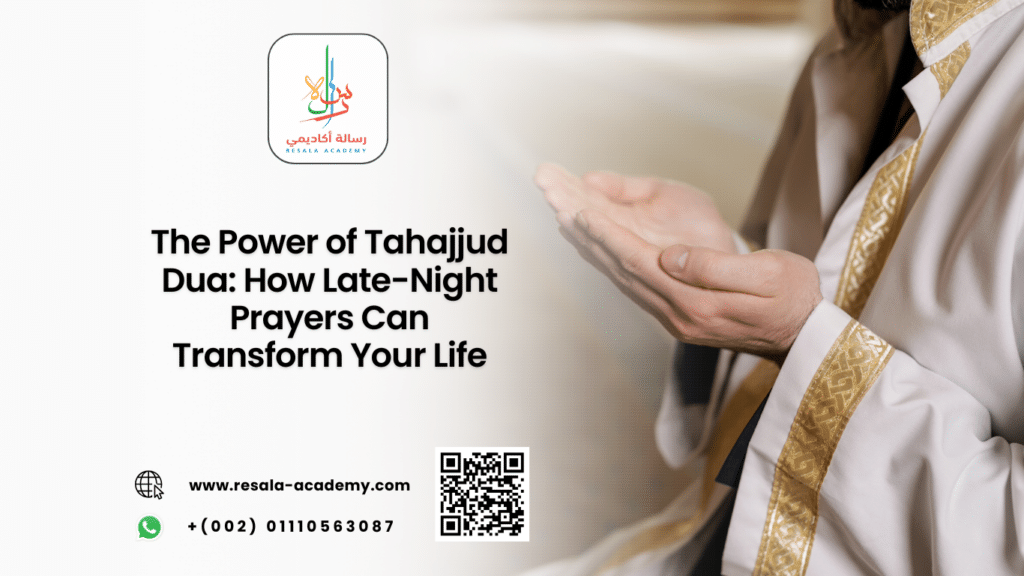Table of Contents
The Power of Tahajjud Dua: How Late-Night Prayers Can Transform Your Life
In the stillness of the night, when the world is asleep, a sacred opportunity presents itself to those who seek divine closeness. The Tahajjud Dua, a powerful supplication made during late-night prayer, holds immense spiritual and personal benefits. This special prayer, performed in the last third of the night, is a gateway to divine mercy, guidance, and success.
For non-native speakers looking to deepen their understanding of Islamic teachings, learning the Arabic language and the Quran is essential. Institutions like Resala Academy provide structured courses to help students master these sacred texts.
In this article, we will explore the significance of Tahajjud Dua, its benefits, and how it can transform your life. We will also provide practical steps to perform this prayer effectively, along with Quranic and Hadith references.
What is Tahajjud Dua?
The Tahajjud prayer is a voluntary night prayer that holds a special place in Islam. It is performed after the Isha prayer and before the Fajr prayer, preferably in the last third of the night. The Dua (supplication) made during this time is believed to be highly effective, as it is a moment when Allah’s mercy is closest to His servants.
Quranic Evidence for Tahajjud
Allah (SWT) commands believers to engage in night prayers, highlighting their significance in the Quran:
وَمِنَ ٱلَّيْلِ فَتَهَجَّدْ بِهِۦ نَافِلَةًۭ لَّكَ عَسَىٰٓ أَن يَبْعَثَكَ رَبُّكَ مَقَامًۭا مَّحْمُودًۭا
“And during the night, wake up and pray as an extra offering of devotion, so your Lord may raise you to a praiseworthy station.”
(Surah Al-Isra, 17:79)
This verse emphasizes that Tahajjud prayer is a means to attain a high spiritual status.
Hadith on the Power of Tahajjud Dua
The Prophet Muhammad (PBUH) said:
يَنْزِلُ رَبُّنَا تَبَارَكَ وَتَعَالَى كُلَّ لَيْلَةٍ إِلَى السَّمَاءِ الدُّنْيَا حِينَ يَبْقَى ثُلُثُ اللَّيْلِ الآخِرُ يَقُولُ مَنْ يَدْعُونِي فَأَسْتَجِيبَ لَهُ مَنْ يَسْأَلُنِي فَأُعْطِيَهُ مَنْ يَسْتَغْفِرُنِي فَأَغْفِرَ لَهُ
“Our Lord descends to the lowest heaven in the last third of every night, saying: Who is calling upon Me, that I may answer him? Who is asking from Me, that I may give him? Who is seeking My forgiveness, that I may forgive him?”
(Sahih al-Bukhari: 1145)
This Hadith highlights the immense opportunity that Tahajjud Dua provides for seeking Allah’s mercy and blessings.
The Benefits of Tahajjud Dua
1. Strengthens Your Connection with Allah
Performing Tahajjud prayer allows you to develop a deep spiritual bond with Allah. It is a time of solitude where you can pour your heart out, seek guidance, and express gratitude.
2. Increases Inner Peace and Mental Clarity
The tranquility of the night enhances focus and mindfulness. Engaging in Tahajjud helps in reducing stress, anxiety, and negative thoughts, leading to a peaceful mind.
3. Brings Acceptance of Supplications
Since Allah (SWT) responds to prayers made during the last third of the night, Tahajjud Dua is one of the most effective ways to have your supplications granted.
4. Leads to Success and Barakah (Blessings) in Life
Many successful individuals attribute their achievements to the habit of waking up for Tahajjud. This prayer brings divine blessings in personal and professional endeavors.
5. Helps in Seeking Forgiveness (Istighfar)
The night prayer is an excellent time to seek forgiveness for past sins. Allah (SWT) is most merciful during this period, granting pardon to those who sincerely repent.
How to Perform Tahajjud Prayer and Dua Effectively
1. Make a Sincere Intention (Niyyah)
Before sleeping, make a firm intention to wake up for Tahajjud.
2. Wake Up in the Last Third of the Night
Calculate the last third of the night by dividing the time between Isha and Fajr into three parts.
3. Perform Wudu (Ablution)
Ensure you are in a state of purity before standing for prayer.
4. Pray at Least Two Rak’ahs
You can pray two, four, six, eight, or more Rak’ahs as per your ability.
5. Make a Heartfelt Dua
After completing the prayer, raise your hands and make Tahajjud Dua sincerely.
6. Recite Quranic Verses and Dhikr
Recite Surah Al-Fatiha, Surah Al-Ikhlas, Surah Al-Falaq, and Surah An-Nas for protection and blessings.
Examples of Powerful Tahajjud Dua
1. Dua for Forgiveness
اللَّهُمَّ اغْفِرْ لِي ذُنُوبِي كُلَّهَا، دِقَّهَا وَجِلَّهَا، وَأَوَّلَهَا وَآخِرَهَا، وَعَلاَنِيَتَهَا وَسِرَّهَا
“O Allah, forgive all my sins, the small and the great, the first and the last, the public and the private.”
(Sahih Muslim)
2. Dua for Guidance and Success
اللَّهُمَّ اهْدِنِي وَسَدِّدْنِي
“O Allah, guide me and make me steadfast.”
(Sahih Muslim, 2725)
3. Dua for Protection from Hardships
اللَّهُمَّ إِنِّي أَعُوذُ بِكَ مِنَ الْهَمِّ وَالْحُزْنِ، وَأَعُوذُ بِكَ مِنَ الْعَجْزِ وَالْكَسَلِ
“O Allah, I seek refuge in You from anxiety and grief, and I seek refuge in You from weakness and laziness.”
(Sahih al-Bukhari, 2893)
Exploring Traditional Tahajjud Dua: The Most Powerful Supplications for Late-Night Prayers
The Essence of Traditional Tahajjud Duas:
- Traditional Tahajjud Dua has been passed down through generations, offering believers a structured way to seek divine mercy, guidance, and success.
- These supplications are deeply rooted in Quranic verses and Prophetic traditions, making them powerful tools for spiritual elevation.
- Unlike general Duas, traditional Tahajjud Dua are often recited in Arabic, preserving their original meanings and spiritual depth.
- They cover various aspects of life, including forgiveness (Istighfar), guidance (Hidayah), protection (Hifz), and sustenance (Rizq).
- Many scholars recommend memorizing these Duas to enhance the effectiveness of Tahajjud prayer and develop a stronger connection with Allah.
Examples of Traditional Tahajjud Dua and Their Meaning
Dua for Seeking Forgiveness
اللَّهُمَّ إِنِّي ظَلَمْتُ نَفْسِي ظُلْمًا كَثِيرًا، وَلَا يَغْفِرُ الذُّنُوبَ إِلَّا أَنْتَ، فَاغْفِرْ لِي مَغْفِرَةً مِنْ عِنْدِكَ، وَارْحَمْنِي إِنَّكَ أَنْتَ الْغَفُورُ الرَّحِيمُ
“O Allah, I have wronged myself greatly, and none forgives sins except You. So forgive me with Your forgiveness and have mercy on me. Indeed, You are the Most Forgiving, the Most Merciful.”
Dua for Seeking Guidance and Strength
“ اللَّهُمَّ اهْدِنِي فِيمَنْ هَدَيْتَ وَعَافِنِي فِيمَنْ عَافَيْتَ وَتَوَلَّنِي فِيمَنْ تَوَلَّيْتَ وَبَارِكْ لِي فِيمَا أَعْطَيْتَ وَقِنِي شَرَّ مَا قَضَيْتَ إِنَّكَ تَقْضِي وَلاَ يُقْضَى عَلَيْكَ وَإِنَّهُ لاَ يَذِلُّ مَنْ وَالَيْتَ وَلاَ يَعِزُّ مَنْ عَادَيْتَ تَبَارَكْتَ رَبَّنَا وَتَعَالَيْتَ ”
“O Allah, guide me among those Thou hast guided, grant me security among those Thou hast granted security, take me into Thy charge among those Thou hast taken into Thy charge, bless me in what Thou hast given, guard me against the evil of what Thou hast decreed, for Thou dost decree, and nothing is decreed for Thee. He whom Thou befriendest is not humbled. Blessed and Exalted art Thou, our Lord.”
Learn the best techniques to memorize and retain the Dua for exams, even as a non-native learner. Strengthen your faith and confidence in your studies!
The Spiritual and Psychological Impact of Reciting Traditional Tahajjud Dua
Strengthens Faith and Tawakkul (Reliance on Allah)
- Reciting traditional Tahajjud Dua instills a deep sense of trust in Allah’s wisdom and mercy.
- It reinforces the belief that Allah (SWT) is always listening, especially during the last third of the night.
- Regular recitation of these Duas helps believers develop patience and resilience in times of hardship.
Enhances Emotional and Mental Well-Being
- The act of supplicating during Tahajjud prayer provides emotional relief, reducing stress and anxiety.
- Studies suggest that engaging in spiritual practices like Tahajjud Dua promotes a sense of inner peace and contentment.
- The quiet solitude of the night allows for deep self-reflection, helping individuals gain clarity on personal and spiritual matters.
Brings Divine Assistance and Life Transformations
- Many believers have experienced miraculous changes in their lives after consistently performing Tahajjud and reciting traditional Duas.
- The Prophet Muhammad (PBUH) and his companions frequently relied on Tahajjud Dua for guidance, success, and protection.
- By incorporating these Duas into daily practice, individuals can witness barakah (blessings) in their personal, professional, and spiritual lives.
By embracing the power of traditional Tahajjud Duas, believers can unlock immense spiritual rewards and experience profound transformations in their faith and daily lives.
Resala Academy: Your Gateway to Learning Arabic and Quran
If you are a non-native speaker looking to understand the Quran and perform Tahajjud Dua with deeper meaning, Resala Academy is the perfect place for you.
Why Choose Resala Academy?
- Expert Instructors: Learn from qualified scholars.
- Flexible Online Classes: Study at your convenience.
- Comprehensive Courses: Covering Arabic, Quran, and Islamic studies.
- Personalized Learning: Tailored lessons for all levels.
Start your journey today with Resala Academy and unlock the treasures of the Quran and Arabic language.
FAQs
1. Can I pray Tahajjud without sleeping?
Yes, but it is preferred to sleep first and then wake up for Tahajjud.
2. How many Rak’ahs should I pray for Tahajjud?
You can pray a minimum of two Rak’ahs and a maximum of as many as you wish.
3. What is the best time for Tahajjud Dua?
The last third of the night is the most recommended time.
4. Can I make Tahajjud Dua in my language?
Yes, you can supplicate in any language after completing the prayer.
5. Does Tahajjud guarantee acceptance of Dua?
While Tahajjud Dua is highly effective, acceptance depends on Allah’s wisdom and timing.
Conclusion
The Tahajjud prayer is a powerful means of drawing closer to Allah, seeking forgiveness, and achieving success. By making Tahajjud Dua, you unlock divine blessings and inner peace.
To fully appreciate and understand the Quranic and Arabic aspects of this prayer, consider enrolling in Resala Academy’s courses. Strengthen your faith, enhance your knowledge, and experience the transformative power of Tahajjud.
May Allah (SWT) grant us the ability to wake up for Tahajjud and accept our Duas. Ameen!




